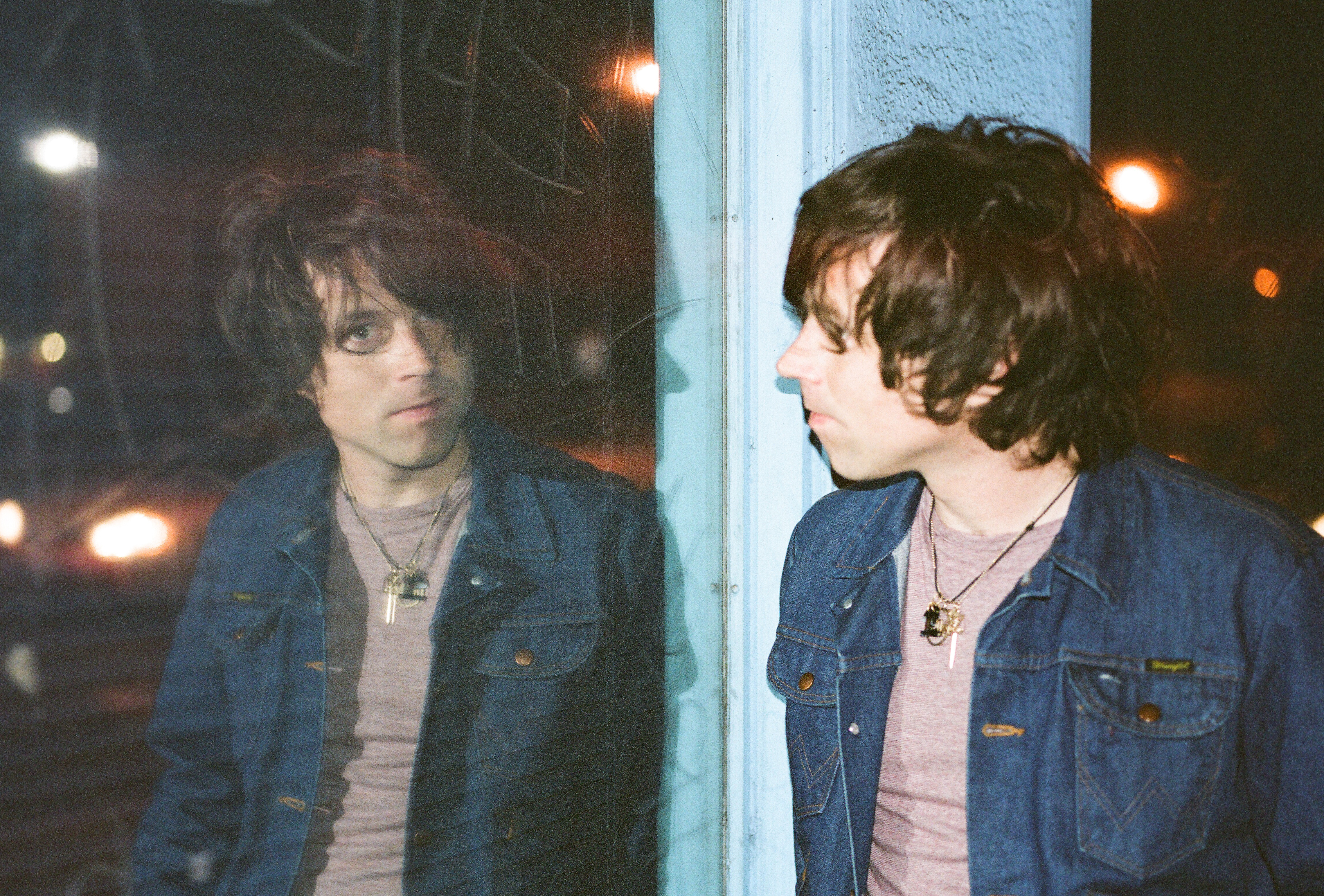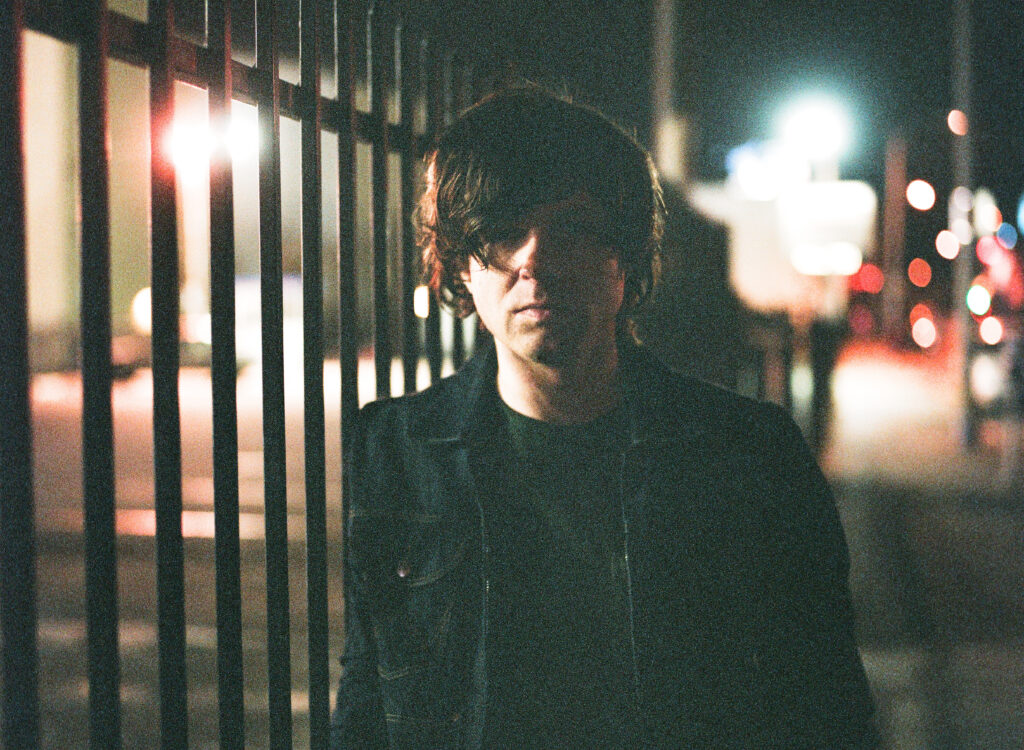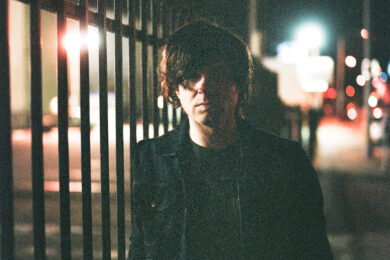Ryan Adams’ beautiful thirteenth album Ashes And Fire is being widely hailed as his best in ten years, but back in 2009 it looked like it would never see the light of day. He had just been diagnosed with Ménière’s Disease, a degenerative hearing disorder, had split with his backing band The Cardinals, and was talking about quitting music completely. He turned his back on New York, the city that looms large in so many of his songs, moved to California, married pop star Mandy Moore and released two books of poetry, Infinity Blues and Hello Sunshine.
Today, taking a seat outside his Soho hotel, Adams cuts a much more settled figure. Peering through a mop of hair and wearing a leather Iron Maiden jacket, he looks a good decade younger than he is (he turns 37 on November 5). The caricature painted of him over the years of a difficult, moody rock star with a ferocious appetite for drugs and booze is light years away from the polite, friendly, open man sipping a cup of tea in the sunshine. With Ashes And Fire breaking the UK top 10, his illness under control and his drinking and speedball-shooting a thing of the past, he talks about the new record, literary ambitions and his dream to form a black metal band called Demonic Booger…
The new album has a real sadness running through it, but it’s not as angst-ridden as a lot of your previous work. Is it coming from a more content place?
Ryan Adams: I don’t know, I think I kind of sound content on a bunch of the records. I think that ‘Cold Roses’ is fun and content. I’m not going to say that I’m content in my life or that I’m not content in my life. Music, records, they’re just like pieces of contemporary art. Even first person song writing is sometimes third person without the listener knowing. It’s the same way that I love extreme metal bands, when I listen to them and they’re singing about sorcery, I know in my mind that there’s not some castle being overrun by orcs and the singer is not hovering above them with some spiritual gaze. The same way that you might say Billy Joel records sound quite happy and casual, and yet he runs his car into houses. But if you’re asking me a personal question about am I more settled, I don’t know. I think I’m still really spastic about art, really excitable. I’m probably having a better time. It has less to do with the idea of being older or from a general idea of something like marriage equals settling down. In my mind a lot of my happiness has a lot to do with the fact that I’m really happy not to have to be with the backing band I was playing with, because I wasn’t enjoying myself and I don’t believe really that they were enjoying themselves. And also because I’m no longer suffering the way that I was from Ménière’s Disease. Although I still have a degenerative ear disease, I changed so much of my lifestyle that it isn’t affecting me in the way that it was, which was really fucking terrible.
How exactly did the disease affect you?
RA: Ménière’s Disease is a degenerative inner ear condition that causes extreme vertigo, extreme nausea, it causes an unbelievable amount of tinnitus. Some people can’t walk from it. The oil sacs in your inner ear don’t operate in the correct way, so up doesn’t feel up and down doesn’t feel down. When you’re having that feeling, the same feeling as when you drop on a rollercoaster, your stomach gets fucked up.
How do you deal with it?
RA: I dealt with it in a lot of extreme ways. You change your diet, you exercise, take supplements, acupuncture, acupressure, hypnotherapy, you do what you can.
You talked about giving up music because of it in 2008 – that must have been a tough decision.
RA: Yeah, well I knew I needed to stop then. There was no treatment. It wasn’t like you have gangrene in your foot so you cut your foot off. It was triggering these different sounds, these busts of loud sounds were causing my middle hearing in my left ear to go. And all these other things that were happening were asymptomatic of it, to the point where I kind of could not get away from it any more. I couldn’t just stuff my ear up and get over it. I couldn’t just say ‘well, I’ll smoke a fat joint before bed and that will get over the tinnitus so I can sleep’. It became really painful.
So it could have ruined your career?
RA: It did affect my career. These things happen and you don’t know what the fuck they are. I missed an English tour once, and people at the time, they were like, ‘Oh, Ryan Adams drinks alcohol and takes drugs, he’s just on drugs’, but I was fucking so sick, and I didn’t know what was happening to my ear. The lights onstage would spin me out. When your balance is off and you’re in front of a couple of thousand people and you’re playing the guitar, it becomes really disorienting. And then you can’t remember the lyrics because your body would adrenalise you know, that feeling when you’re going to fall? That would happen to me standing up because I couldn’t gauge the depth of stuff.
You said people just thought you’d gone on a bender, but you do have a bit of a reputation in that department. [In one interview he said he did speedballs every day for years and that it was a miracle he didn’t die.]
RA: That’s because people asked me direct questions about my drug use when I was in my 20s, and I gave direct answers. I’m one of these people who will say, ‘Yeah, people snort coke’, or ‘People do speedballs, or do heroin, or smoke pot, or take pills’, because I know that that’s what musicians do, and because I did little bit of that. But I actually think that I had a pretty routine… you know, I’d used drugs, but I wasn’t a drug addict, okay? I didn’t stay on drugs, I didn’t cop drugs on the street, you know? And I think the other part of it is that I have a really funny sense of humour, and I’ve always had it, and I think that people thought it had to be with being fucked up, but it’s still there, I’m still myself.

New York was always such a big part of your music. How has the move to California affected this record?
RA: Maybe, maybe not. I made half of my records in California. What I will say is definable about the record is like a lot of my records it’s analogue. The only record that was not recorded completely analogue in my career was Easy Tiger, and it was still recorded through an analogue mic. But this record, it literally could not have been more analogue. The reverb is echo in the room, so there wasn’t even a digital effect on the record. It’s pretty cool.
How have you found the pace of life over there after living in Manhattan for so long?
RA: Well there’s more space. When you live in California you spend a lot of time in a car. You spend a lot of time outdoors. I actually prefer that, because I listen to records in my car and you roll the windows down and you’re driving like in 82-degree weather and it’s always fucking amazing. I think also there’s a dumbness that comes with being in California that’s really nice. Living in New York, there’s an edginess that goes along with it. In California, the most laid back and the smartest people that I’ve met have been there and lived there. You have a place that can have Henry Rollins and Charles Bukowski and Judd Apatow and Stevie Nicks all in one block. You walk down he street and you just walk by Tom Hanks and then you walk by Keith Morris, the original singer of Black Flag. They’re just there. The people who make South Park will be at the café that you’re at, it’s just a thrill, it’s really interesting.
It must be a bit bizarre seeing all those people all the time…
RA: Well that’s the other thing, because it’s the constant sunshine, the surreality of it is there. People say a lot of time, ‘Los Angeles is shallow.’ But I don’t really think a place can be shallow. That’s like saying New Yorkers are mean. No way man, go to New York and talk to someone on the subway, they’re some of the nicest people you ever met, they’re so helpful.
You dedicated this album to your Grandmother, who brought you up…
RA: She’s present in there but there’s no song that’s directly referencing her, but she was on my mind because she was dying. I dedicated it to her but she was dying when I made it. She waited to die until I was done with it so I could come and see her. So that was painful.
You’ve written a couple of well-received written poetry books. Have you got a novel in you?
RA: I do have a novel in me. I was talking to a friend of mind who’s a novelist today actually. So I get tips all the time. It’s a different kind of discipline. To write a novel the way you want to write it, It’s like making a patchwork quilt. First you have to come up with all this stuff, and then you have to tape it together, and then you have to sew it together, and then you have to make sure it fits. I can go to a record naturally and make a song, but to write a novel, I didn’t train myself for that, I trained myself for poetry, so I’m trying to relearn.
What writers are you inspired by?
RA: Some of my favourite novelists in terms of style would be Henry Miller, Hubert Selby Jr, who wrote Last Exit To Brooklyn. Although that book is quite violent, and the transsexual nature, the violence and the descriptive element that’s there, the language is so lush. My friend the novelist, I was talking to her today, and I said, ‘What are you doing?’ She was like, ‘I’m working, I’m at the library today because I have to research the stuff in my book. I realised that an animal in the wild’s brain is 30 per cent heavier than a domesticated animal.’ And that was her job that day. That’s such a cool job.
You made an online-only metal album, Orion, and you’re a massive metal fan. Will you do more of that kind of stuff?
RA: Yeah, absolutely! But I want to make something more Satanic than anyone has ever done. I want it to sound like the devil is taking a poop with reverb on it. Basically something so horrific and amazing. But when I make that stuff I make it with a sense of humour. Like when I was making the Orion record – It wasn’t Ryan Adams, Orion, it was just its own thing. I don’t believe that anyone would ever actually take me for serious when I make metal, and I don’t believe that some metal is meant to be taken that seriously. I think that that is the big fucking misconception with everything from Bob Dylan to metal, I don’t think either of them are meant to be taken that seriously, or that literally. I like the fantasy elements in both of those artists. It isn’t just metal that I mess around with, sometimes we’ll program weird 101 beats and we’ll come up with stuff that sounds the Tom Tom Club has gone insane in my studio, or we’ll do some trippy psychedelic rock. But if I could ever do a heavy project for real I would, and I feel like I will at some point. Look, the worst thing that could happen to my fans is that any of my records ever actually accidentally has a huge song, like a massive, worldwide huge song, because I will fucking quit and I will just start a band called Demonic Booger, just a black metal band. People will just be like, ‘When are you going to make a serious record again?’ and I’ll just be like, ‘Kiss my ass! This is what I’m doing, I don’t have to do shit!’
Which of the metal musicians would you work with?
RA: I don’t really want to work with any of them, I just want to do my own version of everything. Because I think that I like the intensity and speed of black metal. I like that element which means you can be melodic but you can also be completely non-melodic, I think that combination really works. I think it would be really incredible to put elements of the duel guitar and the harmonics of Maiden with the math rock of a band like Lethargy or even Converge, combine those elements with pure black metal, like in the sense of Mayhem’s Deathcrush, real Armageddon stuff. I also think that there aren’t enough female singers in black metal. I love the Japanese band Sigh, she’s unbelievable that woman [vocalist Mirai Kawashima]. I think it’d be cool to incorporate that level of actual corpse paint black metal with actual feminine elements, that would be really cool.
It’s fair to say women are pretty outnumbered at black metal gigs.
RA: Why do you think that is? I saw a woman in the airport the other day and she had an Emperor badge on her jacket and a Coven shirt on. I was like, ‘Who the fuck is this?’ And she didn’t have tons of stuff hanging off her face or anything like that, she just looked like a regular girl, like you or me, like a regular person, and she was sporting all that stuff and I didn’t get a chance to say anything. They are out there! Do you think it’s because maybe the metal scene is so masculine and so oppressive? Dominated by a lot of testosterone? In America we call those people meatheads.



